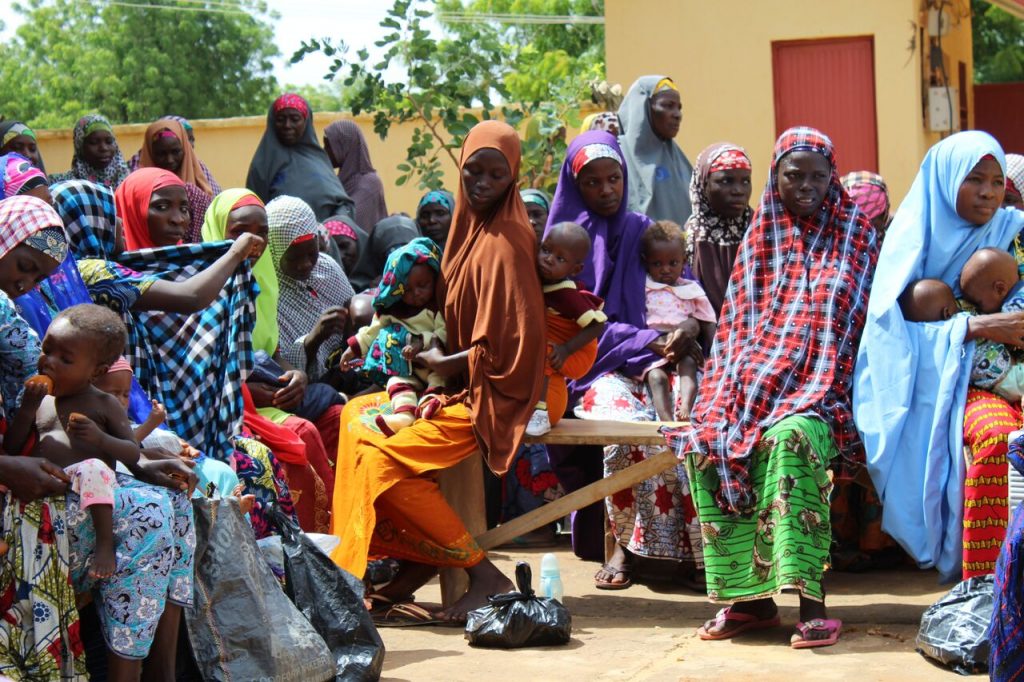
Conflict, Crisis and Hunger in
Northeast Nigeria
Conflict and food shortages in northeast Nigeria have created one of Africa’s worst humanitarian emergencies, with more than 8.3 million people—80% of whom are women and children—estimated to be in urgent need of humanitarian assistance. Nearly 4.1 million people in northeast Nigeria face crisis-level food insecurity or worse.
Internal conflict has exacerbated this humanitarian crisis, forcibly displacing more than 2.1 million from their communities inside northeast Nigeria and driving more than 300,000 northeast Nigerians to take refuge in neighboring countries. Because insurgents in Nigeria target the aid workers who provide essential nutrition services, food insecurity is a constant concern. In some areas, women and children face famine conditions if humanitarian aid does not reach them.
The insurgency also has spread to neighboring countries—Cameroon, Chad and Niger—where violent attacks disrupt daily life and displace civilians. In these neighboring countries, millions face food insecurity and millions are displaced from their homes.

8.3 million
people in need of emergency assistance
2.1 million
people are internally displaced
4.4 million
face crisis-level food insecurity or worse
Frequently Asked Questions
-
What is driving the crisis in northeast Nigeria?
Armed groups and the conflict they create are the main drivers of the crisis. This conflict has forced people from their homes, destroying livelihoods, the economy and social norms. Families that once were able to feed and house themselves can no longer do so. As a result, 4.4 million people face severe food insecurity. The crisis can be felt throughout the Lake Chad region, with economic activity declining due to insecurity and the resulting exodus to avoid chaos and violence. Across the region, nearly 2 million children suffer from acute malnutrition; the UN estimates that 8.3 million people will need humanitarian assistance in 2023.
-
Why is Nigeria at risk of famine?
Constant displacement and instability have caused food production in northeast Nigeria to plummet. Amid the chaos and violence, food prices have soared while the nation relies on imported food that, in previous years, farmers had grown domestically. For example, Borno state, the current epicenter of the crisis, once produced 25% of the nation’s wheat. It now produces virtually none. Similarly, over the past 10 years, sorghum production in Borno has dropped by 82%, rice by 67% and millet by 55%, according to the International Crisis Group. Livestock has also been decimated and those animals remaining in the communities are often stolen by insurgents to fund the purchase of weapons and ammunition.
Insurgent attacks and the military’s response have destroyed essential infrastructure, including hospitals, clinics and schools, as well as markets and trade routes. Insurgents also kidnap farmers or extort money from them to “allow” the farmer to continue living and working on their own land. Humanitarian organizations, including International Medical Corps, struggle to reach these areas safely and deliver lifesaving assistance—and without humanitarian aid, community members become even more vulnerable to famine.
-
What are the biggest humanitarian challenges?
Access to populations in need remains a major challenge in northeast Nigeria. The insurgents’ sphere of control has increased, as has their capacity to conduct raids, disrupting the lives of area residents and displaced persons while hampering humanitarian relief efforts. Insurgent violence has added to the challenges of providing food assistance, treatment for malnutrition and other services where the needs are the greatest. Currently, 43% of displaced northeast Nigerians live in camps for internally displaced persons (IDPs), while the rest of the displaced persons live in host communities or in makeshift camps, making them more difficult to identify, protect and provide with lifesaving assistance.
-
What specifically is International Medical Corps doing to help?
International Medical Corps has worked in Nigeria since 2013. Today, we work in Borno and Kano states to provide healthcare, nutrition, gender-based violence prevention and response, food security and livelihoods support, and water, sanitation and hygiene services, providing lifesaving assistance to more than 65,000 people per month, primarily in IDP camps. We also are responding to the emergency needs of IDPs in Chad and Cameroon.
Through the Core Group Partners Project for Polio Eradication, International Medical Corps also has been a key partner in the eradication of the wild poliovirus in Nigeria, which was the last country on the African continent where it was found. With our partners, we continue to seek and prevent any forms of the virus in Nigeria through surveillance and vaccination programs, which we operate in remote and often dangerous areas, like Borno state.
The Challenges
Our Response

International Medical Corps is responding to needs involving nutrition, food security, protection, and water, hygiene and sanitation in conflict-affected communities in northeast Nigeria, serving IDPs and host-community residents. Our response includes distributing food to an estimated 171,000 people in Borno state, as well as providing treatment for malnutrition in conflict-affected communities. We also train local residents to serve as community health volunteers and community health extension workers, equipping them with the skills needed to screen children for malnutrition, administer treatment (including providing ready-to-use therapeutic food) and follow up on their progress.
In Cameroon, International Medical Corps is delivering emergency medical, nutrition and mental health services to Nigerian refugees in Minawao camp. We also are providing child protection activities and GBV prevention and response for women, girls and boys in the camp, which is home to some 56,000 Nigerian refugees. In addition, we are responding to the needs of Cameroonians displaced by ongoing violence in the Far North region of the country, providing them with medical care, nutrition services, disease surveillance, GBV prevention and protection activities, and access to water and sanitation.
In Chad, International Medical Corps collaborated with the Ministry of Health to provide health centers with primary healthcare, maternal health and nutrition support to more than 20 health facilities in the Lac region, where attacks from Boko Haram compromised the well-being of local communities. Our services included managing the nutrition stabilization center at Bagasola Hospital and offering medical and nutrition services to Nigerian refugees in in Dar es Salam camp.


